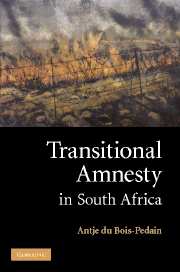Book contents
- Frontmatter
- Contents
- List of cited Amnesty Committee hearing transcripts
- Frequently cited Amnesty Committee decisions
- List of abbreviations
- List of abbreviated cases
- List of figures
- Preface
- Introduction
- 1 The TRC-based Amnesty Scheme: Background and Overview
- 2 The Practice of the Committee When Making Decisions
- 3 The Committee's Interpretation of the Political Offence Requirement
- 4 The Concept of Full Disclosure
- 5 Truth Recovery in the Amnesty Process
- 6 Victim Empowerment in the Amnesty Process
- 7 Perpetrator Accountability in the Amnesty Process
- 8 Conditional Amnesty and International Law
- 9 Conclusion
- Bibliography
- Index
3 - The Committee's Interpretation of the Political Offence Requirement
Published online by Cambridge University Press: 24 July 2009
- Frontmatter
- Contents
- List of cited Amnesty Committee hearing transcripts
- Frequently cited Amnesty Committee decisions
- List of abbreviations
- List of abbreviated cases
- List of figures
- Preface
- Introduction
- 1 The TRC-based Amnesty Scheme: Background and Overview
- 2 The Practice of the Committee When Making Decisions
- 3 The Committee's Interpretation of the Political Offence Requirement
- 4 The Concept of Full Disclosure
- 5 Truth Recovery in the Amnesty Process
- 6 Victim Empowerment in the Amnesty Process
- 7 Perpetrator Accountability in the Amnesty Process
- 8 Conditional Amnesty and International Law
- 9 Conclusion
- Bibliography
- Index
Summary
The findings presented in the previous chapter demonstrate the Committee's generosity in its application of the political offence requirement. Nearly 90 per cent of bona fide amnesty applications succeed, irrespective of the very serious nature of many of the deeds concerned. Statistically, it makes no perceptible difference for the outcome of amnesty applications whether the applicants acted on orders or whether they used their own initiative and discretion. There are even cases where the Committee is prepared to accept amnesty applications by applicants who wilfully stepped outside their organisation's policies or beyond the confines of their internal organisational mandate. At the same time, it is clear that the Committee does not merely rubber-stamp applications by persons who acted in their capacity as members or supporters of political organisations, or as state employees. Not only does the need for full disclosure constitute a real hurdle for applicants whose deeds might otherwise qualify for amnesty, but some deeds are considered ineligible for amnesty despite their obvious political background. Information-related reasons play a role in only 41.1% of rejected amnesty applications. Almost 60% of rejected applications fail because the applicant's activities themselves did not pass muster, either because of his motive or because of some feature of his act.
This chapter strives to understand the Committee's notion of the political offence requirement in the light of these findings.
- Type
- Chapter
- Information
- Transitional Amnesty in South Africa , pp. 97 - 138Publisher: Cambridge University PressPrint publication year: 2007



